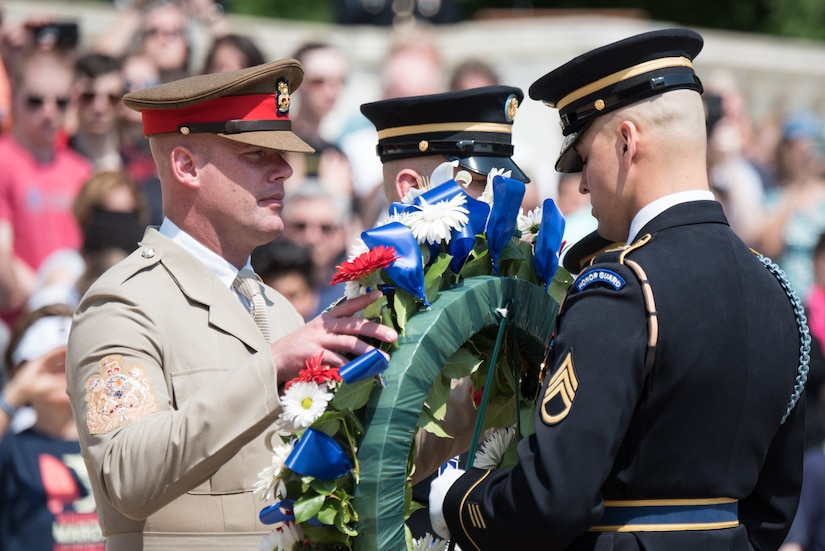By Terri Moon Cronk, DoD News, Defense Media Activity
WASHINGTON -- In a show of unity, the senior enlisted
leaders of the American and British armies together laid a wreath at the Tomb
of the Unknown Soldier at Arlington National Cemetery, visited with U.S. junior
enlisted service members and toured the Defense Department’s newest combatant
command, U.S. Cyber Command, at Fort Meade, Maryland, May 15.
DoD’s senior enlisted advisor to the chairman of the Joint
Chiefs of Staff, Army Command Sgt. Maj. John W. Troxell; and the United
Kingdom’s first army sergeant major, Warrant Officer Class One Glenn Haughton,
embody the alliance initiative of the National Defense Strategy, having worked
well together for nearly four years.
“Glenn is not only a personal friend of mine, but he is
well-known globally,” Troxell said of Haughton, who is visiting the Defense
Department this week.
“We have a very strong senior enlisted global network. And
even though he is the Army sergeant major in the U.K., he is known by leaders
in the United States, in coalition [nations] and other services as well,”
Troxell added.
Troxell said his military partnership with Haughton is fluid
and dynamic. “We know each other so well it allows us to share information
freely, and allows us to be honest with each other,” he said.
“That just doesn't happen overnight between two senior
enlisted from different nations,” Troxell added. “That has to be built over
time, and it’s important because one of the things that we focus on with our
National Defense Strategy is reassuring our allies. That means more and more
with people like Sergeant Major Haughton, I have to have a dynamic relationship
because of the nature and the closeness of the U.K. and the U.S.”
Relying Upon Partners
Haughton said he relies heavily on his U.S. friends and
colleagues across the services.
“I couldn't have done my job without the people that I've
met,” the British army sergeant major said. “Everything I’ve tried to implement
in the British army has been other people's ideas, and other people's visions
and initiatives, and I’ve just drawn from that to better the lives of the
enlisted in the British army.”
Haughton’s passions as the senior enlisted leader in the
British army are personal development and education for his troops.
“Personal development and military education are changing
for the better, and we've got people on some serious educational programs,” he
said. “That's happened over the last four years and it's just going to continue
and grow in strength.”
Haughton also is the first international mentor for the U.S.
military’s Keystone Command Senior Enlisted Leader course, Troxell pointed out.
“My first thought was Glenn, because of his reputation
globally, the charismatic kind of leader he is, and how he can deliver a
message and people understand it,” he said.
Opening British Army Communication
His position as the British army’s first sergeant major has
opened up the chains of communication between his sergeants, mid-grade
noncommissioned officers and petty officers at the higher echelons, Haughton
said.
“It’s another means of communication, and it's worked both
ways. The senior echelons of the army now see that this job complements the
chain of command. It only challenges it when it needs to for the benefit of the
enlisted,” he said. “But for soldiers and officers, I think they look at this
[sergeant major of the army] position as a benefit to the whole of the service
itself.”
Troxell said this week’s meeting between he and Haughton --
and particularly the wreath-laying ceremony at Arlington -- is an opportunity
to showcase the strength of the U.S.-U.K. alliance.
“The greatest competitive advantage we have over any threat
-- whether it's a nation state or a non-state actor like [the Islamic State of
Iraq and Syria], is our trained, educated, trusted and empowered enlisted
force,” Troxell said.
He added, “The more our relationship is solid, and the more
we continue to collaborate and share information and experiences, the more
powerful we're going to be able to be, and the more we're going to be able to
build on that [competitive] advantage.”

No comments:
Post a Comment